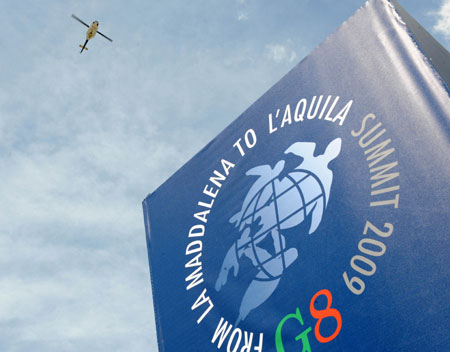Leaders from the Group of Eight (G8) industrialized countries and emerging economies are expected to make a new push for reform of the global financial system when they meet for a summit as from Wednesday.
 |
|
A helicopter was seen flying above the makeshift media village for 2009 G8 summit in L'Aquila, Italy on July 7, 2009. Media personnel from across the world began to swarm into the media village in L'Aquila, the quake-striken capital of central Italy's Abruzzo region where 2009 G8 summit and other related international meetings will be held from July 8-10. |
While the venue for the summit, namely the Italian town of L'Aquila, is an earthquake-stricken area which is still under reconstruction, the global financial system and the world economy also need rebuilding amid the financial crisis.
New push for new rules
As the host, Italy has put it high on the agenda of the three-day summit to revamp the global financial system and rewrite ground rules for world economic activities.
"The main issues on the Italian presidency's agenda are a response to the global economic and financial crisis, and the restoration of grassroots confidence and a boost to growth on a more solid and balanced basis, also through the definition of new, shared ground rules for economic activities," the Italian government said on its official website for the G8 summit.
The financial crisis, which broke out last autumn, has dragged the world into the worst-ever recession in 60 years, prompting international efforts to strengthen financial regulation so as to prevent recurrence of the crisis.
Leaders from the Group of 20 (G20) major economies met for the first time on the financial crisis in Washington last November, marking the beginning of global financial reform.
The Washington summit was soon followed by a similar one in London early April, where G20 leaders reached broad agreements on stricter financial rules and an overhaul of international financial institutions.
A third summit is scheduled to be held in Pittsburgh of the United States this September, while the G8 summit goes between.
"The L'Aquila summit will set out principles, which will be the basis for the G20 summit to establish specific measures, including reform of the World Bank and the International Monetary Fund," Italian Foreign Minister Franco Frattini said in a recent interview with Xinhua.
Lecce framework to be debated
In preparation for the G8 summit, finance ministers of the eight rich countries met in Lecce, south of Italy, one month ago. They hammered out an agreement on the new push for global financial reform, which would be discussed by G8 leaders this time.
The so-called Lecce Framework includes a set of common principles and standards regarding the conduct of international business and finance.
"We agreed on the need to develop the Lecce Framework which builds on existing initiatives and lays the foundation for a stable growth path over the long term," G8 finance ministers said in a statement then. "We are committed to working with our international partners to make progress with this initiative, with a view to reaching out to broader fora, including the G20 and beyond."
They said for the market economy to generate sustained prosperity, fundamental norms of propriety, integrity and transparency in economic interactions must be respected.
"Reform efforts must address these flaws in international economic and financial systems with resolve. This will require promoting appropriate levels of transparency, strengthening regulatory and supervisory systems, better protecting investors, and strengthening business ethics," the statement said.
The Lecce Framework classified a wide range of instruments into five categories, namely corporate governance, market integrity, financial regulation and supervision, tax cooperation, and transparency of macroeconomic policy and data.
Specific issues covered include, inter alia, executive compensation, regulation of systemically important institutions, credit rating agencies, accounting standards, the cross-border exchange of information, bribery, tax havens, non-cooperative jurisdictions, money laundering and the financing of terrorism, and the quality and dissemination of economic and financial data.
One step in a long process
So far, both the United States and the European Union (EU) have adopted an ambitious package to strengthen financial regulation, but differences remain on how far they should go in the international push.
Even within the EU, Germany and France even can not see eye to eye with Britain. While Berlin and Paris strongly support tougher financial regulation, London is simply afraid that its financial power would be undermined.
German Chancellor Angela Merkel warned ahead of the G8 summit that governments would fight off any attempt by banks to water down tough reforms of financial regulations.
"There is perhaps a certain danger that banks which are doing quite well again might try to not exactly support the regulation efforts, but to put them in doubt again," Merkel told the Wall Street Journal Europe in an interview.
She said that bank reforms must not wane although the economy is showing tentative signs of improvement.
Putting the results of the G8 summit into doubt, Italian Prime Minister Silvio Berlusconi played down on Friday any prospect of the summit agreeing new rules for global finance, saying it will be just "one step" in a long process.
"We will need many steps before we arrive at a common rulebook," Berlusconi said. "L'Aquila is one step towards further analysis."
(Xinhua News Agency July 8, 2009)